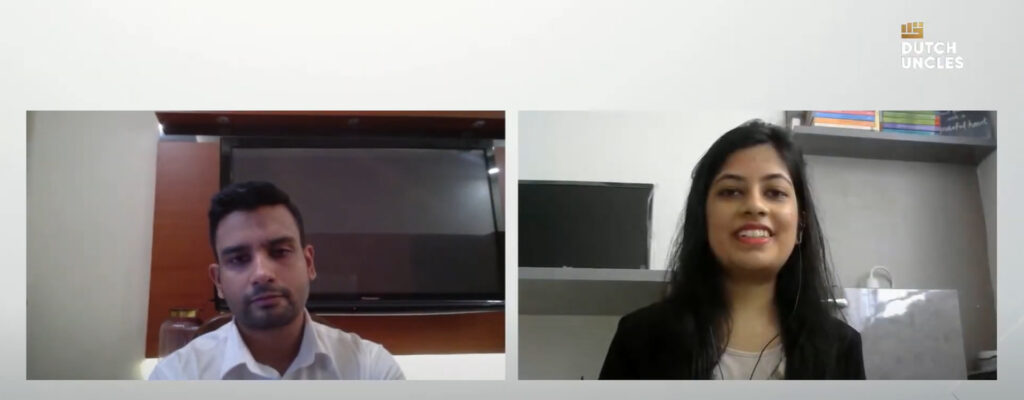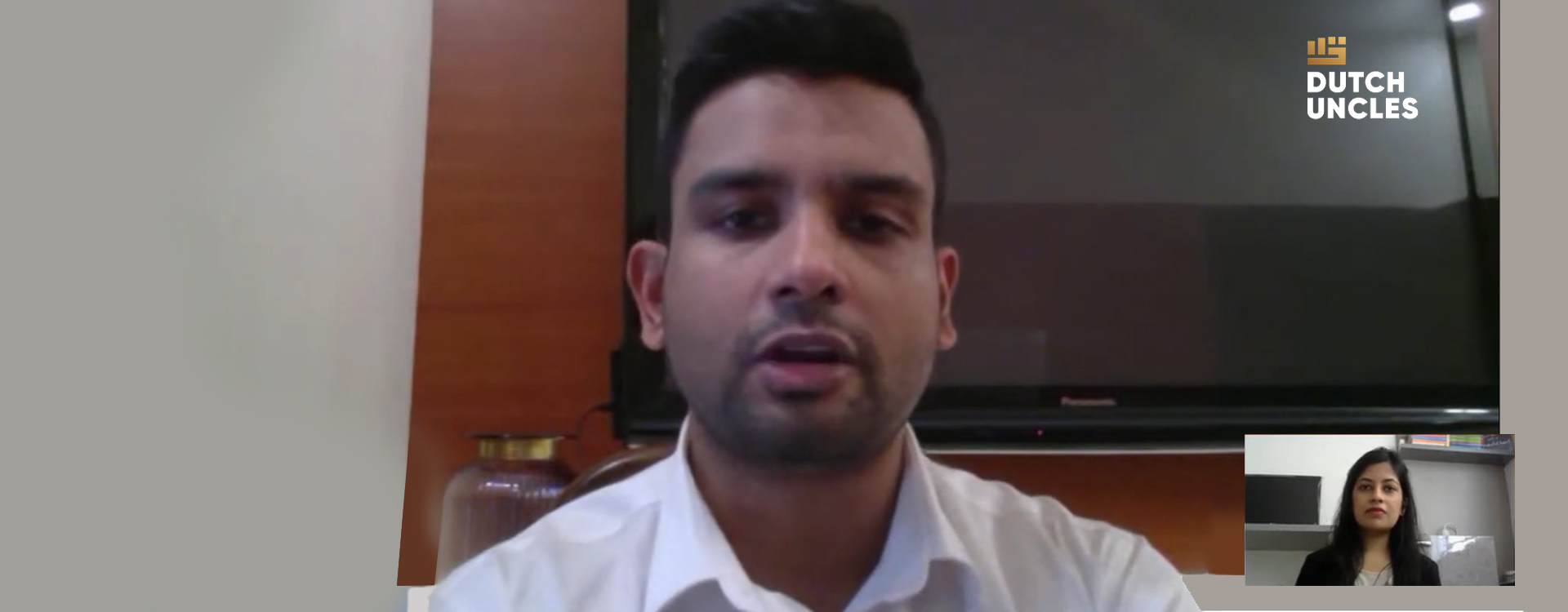A true entrepreneur is the one who can cascade the real-life learnings to aspiring and budding entrepreneurs. With this objective, Dutch Uncles started a new LIVE series – Innerview, Only the Paranoid Survive. This talk show hosts successful entrepreneurs who share their personal stories of diving into the business world and challenging themselves to encounter success.
In the Episode “The Desi Burger Man and his Entrepreneurial Journey,” Rajat Jaiswal, Co-founder, Wat-A-Burger, vividly talks about instances, anecdotes and strategies which led to the success of a bootstrapped startup.
Wat-A-Burger Can Do
As soon as the flight lands, the pilot dons his armour of business skills bringing a fresh new flavour of Indie-Burgers. How did the man behind Wat-A-Burger spurred the QSR industry with his aeronautical skills?
Here are some excerpts from the interview:
What convinced you to choose the idea of ‘Burger’ as a business start-up?
If you look at every industry, the food industry amongst them is the safest precisely because it’s one of the industries which is running in every scenario. When somebody is happy, they will go out to eat. When somebody is sad, they will go out to eat to cheer them up. If they have some celebration, they will go to a restaurant and celebrate so the food industry remains versatile even in the grimace of circumstances.
My idea was that I can lean into the food segment but what food segment was the main question. I realised that Quick Service Restaurant (QSR) has a lot of scope. Back in 2015-16, when we actually started this venture, QSR was rapidly growing. The pace was almost 30-35% an year but of that, burgers and sandwiches happened to be just about 2-3%.
Burgers were always seen as not a mainstream food but just a sidekick snack for a general Indian clientele. That was precisely because they would not have Indian Flavours in them. They would not connect mayonnaise, bun and patty as something they can have for dinner or lunch and this was something that we wanted to change.
At Wat-A-Burger we started making recipes which were Indian flavours fused inside a burger. So, when a person takes a bite, it is filling the stomach. It is also filling his appetite for the food that he wanted to have. Moreover, it was easy to scale.
‘‘
Burgers were always seen as not a mainstream food but just a sidekick snack for a general Indian clientele.
How was the response from your first set of customers?
When we started off, this was not a very famous brand. It was just a start-up and we had a shop which was just across the road to a very famous western burger joint. It wasn’t that he wanted to go head-on with them but there was a very simple ideology:
We already have people who are interested in eating a burger around. We just have to pull them to our store, so the task becomes half easy.
We did some marketing trials known as a ‘Burger Trial’. We would slice a burger into four halves, put some toothpicks around and ask our team to stand outside making people, who are walking around, to taste them. The simple offer was – if you like it, you come to the store and order. If you still don’t like your meal with what you have ordered, it is absolutely free and on the house.We ran this campaign for almost 4 months and there was not even one bill that was asked to be reimbursed!
It was an extreme hit and now you see that even some of the major brands are now making their focus towards shifting the basic taste and feel of a burger or a western food into an Indian flavour-based product. So we did that well in time and we did that much ahead of everybody else in the market.
In your journey, from ideation to a successful brand, what were the challenges?
Setting up a restaurant has its own set of challenges including setting up the manpower, handling your capacity, handling your quality, maintaining consistency in your products and product delivery, managing the brand, making it famous. However, when you are making something which is to be scaled to a brand like Wat-A-Burger, there are other problems also at hand such as brand adaptation or acceptance of the product as a brand.
We started with one store. From one store to a level where it is seen as a brand was a big walk. Our biggest hurdle was how to do this.
Our primary mode of expansion has been franchising. You select the person who’s fit to run a restaurant, who are of the same ideology, who love food, who want to run their own places. They have to perceive your product as prime and supreme as something which is a brand. This was challenging.
With just one or two outlets, when you start franchising, the first question people ask you is: Is this a brand? Or Can you actually scale to 100 restaurants? That question has to be answered. So, every single deal that we cracked, every single contract that we signed, every single product that we had on board was all done with the concept of 100 clusters.
We had that vision when we started – five years ago. Gradually, as we started growing, post 8 – 10 stores, that vision started turning into a reality.
Audience Asks
Any plans to venture outside India?
Yes, of course. A friend of mine who also happens to be a pilot and entrepreneur is running a successful chain of hotels in London. We are planning to set up a store together in Scotland and that will be the first Wat-A-Burger store outside India.
We already have a supply chain system where we can make a provision to supply all the unique sauces that Wat-A-Burger uses, to any country outside. We have a setup to replicate our recipes outside, starting from beverages to burgers, to wraps, to sandwiches, to everything.
UK being the first country, we want to enter parts of Scotland, and also, Australia is on the cards. We’re talking to somebody for the master franchisor and some parts of UAE and Qatar also on the books.
How much dependency should a business have on technology?
Well, see technology is efficiently replacing manpower requirements to some extent. At the same time, you should not completely rely on it for replacing your manpower, because a human element asset is something which your machine will never (or a lot of leap years ahead) be able to replace.
Considering Wat-A-Burger, technology has really taken a good show. We’ve replaced a lot of quality checks and area manager teams through technology. We are now using the SAAS base checklist through a platform where all the store opening and closing checklists are done digitally. These are processes which were done earlier through messaging apps, like WhatsApp, getting pictures from the store, calling up stores, doing it manually. So, technology is really taking up even simpler tasks like billing, the POS systems have been redesigning that and are making it more efficient.
We’ve just moved to a QR code-based ordering system, where we will have in-car dining, a modular drive through or I would say a virtual drive through. All of this is really helping a business scale up. My costs are very much controlled compared to what I would have to spend if I did not have the use of technology.
‘‘
Technology is really taking up even simpler tasks like billing, the POS systems have been redesigning that and are making it more efficient.
Watch the Full Episode
This Episode of Innerview, featuring Rajat Jaiswal, Co-founder, Wat-A-Burger, was virtually attended by viewers across YouTube, LinkedIn, Facebook and Twitter. From aspiring entrepreneurs, small business owners, restaurant owners to entrepreneurs from the Food and Beverage Industry, many business enthusiasts attended the LIVE show.
A video guide for bootstrapping your business, managing a robust supply chain, adopting sure-shot revival strategies and business approach, this talk show reveals several keys to business success.
Transcription by: Chetna Gupta





